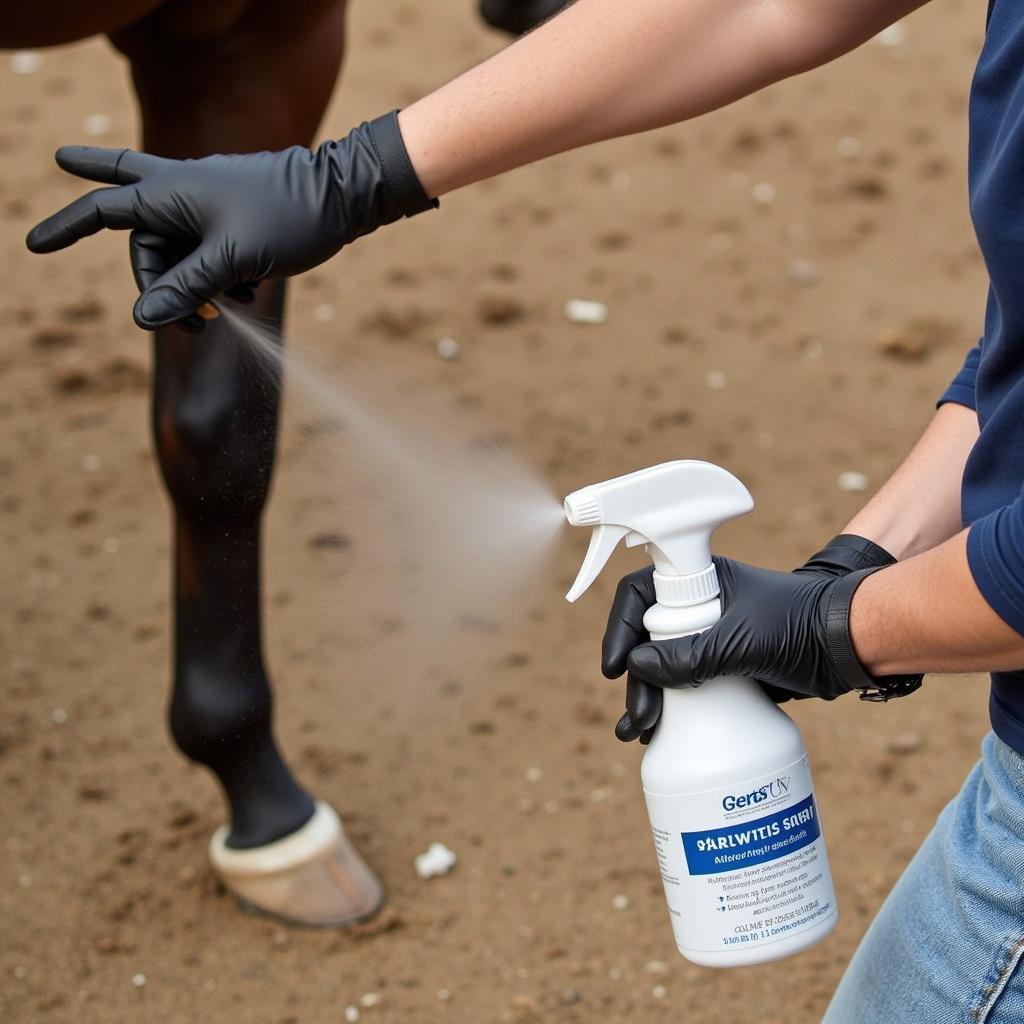Horse Spray is an essential part of equine care, protecting your horse from biting insects and other pests. Choosing the right horse spray can significantly impact your horse’s comfort and health, especially during warmer months. This comprehensive guide will delve into the world of horse sprays, covering everything from different types and application methods to safety precautions and frequently asked questions.
Understanding the Different Types of Horse Spray
Choosing the right horse spray depends on the specific pests you’re targeting and your horse’s individual needs. Here’s a breakdown of common types:
-
Fly sprays for horses: These are the most widely used and formulated to repel flies, mosquitoes, and gnats. They often contain pyrethrins, permethrin, or DEET as active ingredients.
-
Horse mosquito spray: Specifically designed to combat mosquitoes, these sprays can be crucial in areas with high mosquito populations and the risk of mosquito-borne diseases.
-
Tick spray for horses: Essential for protecting horses from ticks, which can transmit Lyme disease and other illnesses, these sprays typically contain permethrin or other acaricides.
-
Blue spray for horses: Often used as a wound treatment or to deter flies from landing on sensitive areas, blue spray typically contains an antiseptic and fly repellent.
Choosing the right horse spray can sometimes feel overwhelming. “Remember to always check the label and choose a product specifically formulated for horses,” advises Dr. Emily Carter, DVM, specializing in equine medicine at Equine Wellness Center.
Applying Horse Spray Effectively
Proper application is key to ensuring your horse receives maximum protection. Here’s a step-by-step guide:
- Groom your horse: Remove any dirt or debris from your horse’s coat before applying the spray.
- Wear gloves: Protect your skin by wearing gloves during application.
- Apply evenly: Spray the product evenly over your horse’s body, avoiding the eyes, nose, and mouth.
- Reapply as needed: Follow the manufacturer’s instructions for reapplication frequency.
“Don’t forget to apply spray to areas where flies and other insects tend to congregate, such as the legs, belly, and face (avoiding the eyes, nose, and mouth, of course!),” recommends Sarah Miller, an experienced horse trainer and owner of Sunny Meadows Stables.
 Applying Horse Spray Correctly
Applying Horse Spray Correctly
Safety Precautions for Using Horse Spray
While horse spray is generally safe, it’s important to take precautions:
- Follow label instructions: Always adhere to the manufacturer’s guidelines for usage and dosage.
- Store safely: Keep horse spray out of reach of children and pets.
- Ventilate well: Apply the spray in a well-ventilated area to avoid inhaling fumes.
- Monitor for reactions: Watch for any signs of skin irritation or allergic reactions in your horse.
Conclusion: Protecting Your Horse with the Right Spray
Horse spray is a vital tool for protecting your equine companion from pesky insects and potential diseases. By understanding the different types of sprays available and following proper application and safety guidelines, you can ensure your horse stays comfortable and healthy throughout the season. Remember to consult with your veterinarian for personalized recommendations based on your horse’s specific needs and the prevalent pests in your area.
FAQs
- How often should I apply horse spray?
- Can I use human insect repellent on my horse?
- What are the common side effects of horse spray?
- Are there natural alternatives to chemical horse sprays?
- How can I prevent insect bites on my horse besides using sprays?
- What should I do if my horse has an allergic reaction to horse spray?
- How do I choose the right horse spray for my horse’s specific needs?
Common Scenarios
- Scenario 1: Your horse is constantly stomping its feet and swishing its tail. This could indicate fly irritation, necessitating horse spray.
- Scenario 2: You’re planning a trail ride in a wooded area known for ticks. Applying tick spray for horses is crucial.
- Scenario 3: Your horse has a minor wound. You might consider using blue spray for its antiseptic and fly-repellent properties.
Further Reading
For more information, check out these resources:
Need help? Contact us 24/7: Phone: 0772127271, Email: [email protected], or visit us at QGM2+WX2, Vị Trung, Vị Thuỷ, Hậu Giang, Việt Nam.